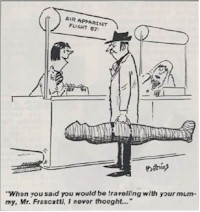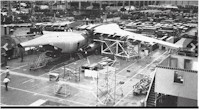|
|
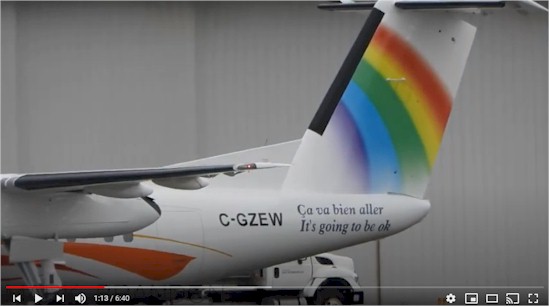 |
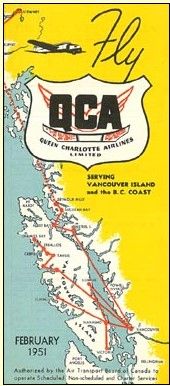 Here we have this timetable from Queen Charlotte Airlines dated February 1951 from the collection of Bjorn Larsson. Here we have this timetable from Queen Charlotte Airlines dated February 1951 from the collection of Bjorn Larsson. |
|
Chipmunk CF-CXQ at Toronto Island. It was one of a batch loaned by the DND to Canadian flying clubs to be used by wartime pilots to "keep current". 'CXQ', by then privately owned, had a bad ending at Vancouver airport on February 7, 1968. That day a Standard Airways 707 on lease to CPA was landing from Honolulu, when pilot disorientation due to a sudden fog resulted in a dreadful crash. The 707 went out of control, careered across the airfield, plowing up cars, parked planes and buildings, "CXQ" included. A Globe and Mail report quoting the head of Standard Airways said, "Neither the captain nor the control tower had been aware of this fog. Then, suddenly, all hell broke out". The report adds, "The plane slewed right, away from the terminal, crashed through a wire fence, burying its nose in the Aviation Electric Pacific Ltd. building." One of the 707 crew and a man on the ground were killed. (Source: via Larry Milberry from the collection of Al Martin www.canavbooks.wordpress.com) |
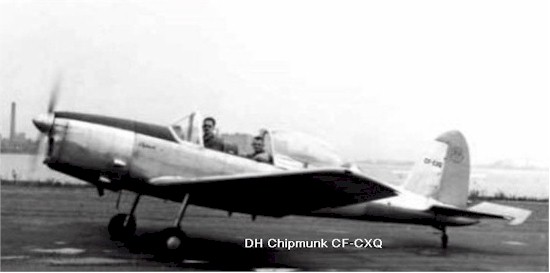 |
 |
| Issue September 1991. |
|
Intair to cease operations. Intair ceased charter operations November 3, 1991. The charter operations were all that remained after the Montreal-based airline sold its turboprop assets to Canadian Regional Airlines in March and kept its five Fokker 100 aircraft and operated charters. |
|
Canada to end Singapore pact. Canada has announced it will cancel an agreement allowing Singapore Airlines (SIA) to fly Singapore to Toronto. Federal Transport Minister Jean Corbeil said the decision is because SIA's Singapore-Vienna-Amsterdam-Toronto turnaround service is drawing mostly Europe-Canada traffic providing unfair competition for Canadian carriers. He said the one-year notice of termination should prompt renewed negotiations between the countries. Air Canada which has the rights to fly to Singapore, voluntarily ended its service in January 1991. |
| Issue dated April 1993. |
|
Super Hub. Hawaii employees have been instrumental in the continued success of the Honolulu "Super hub," through which customers destined for the South Pacific must travel. From the left, Ron Mitsuyoshi, Rachel Sambueno, Claire Lubick, Charlie Dacoscos, Al Sunn, Emily Butin and Mimi Foxx. Back row center, Steve Cariaga, Yvonne Lau, Georgie Ho, Jennifer Salviejo; back row, Richard Shozuya, Richard Abiva and Karen Machida. |
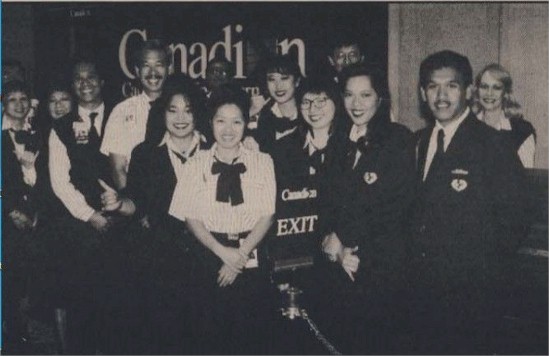 |
|
Plans for Quarantining Arriving International Passengers in Spain and the UK. Both Spain and the UK plan to impose mandatory 14-day quarantine periods on all international arrivals. Travellers breaking the new rules face criminal charges and even deportation. While it accepted that health must remain the top priority for both the industry and passengers, European Regions Airline Association (ERA) said that “a more united and interconnected approach, without the need for restricted quarantine measures, would allow aviation, together with the tourism sectors, to restart.” (Source: aviationweek.com (Registration required) - May 13, 2020) |
|
Central Airlines.
Gone were Cessna's classic curved "tail feathers" and "tail dragger"' look. As you can see in this view, Cessna switched to a new squared-off look, plus tricycle gear with steerable nose wheel. The new plane came on the market at $8,750. The Wong brothers of Central Airways were quick to recognize where things in their world of aviation were heading, so immediately ordered one of the first 172's — CF-IKB. Current owner, Jim Bray, notes, "CF-IKB came off the line at Cessna on October 28, 1955 and left for Canada on November 3, 1955". Al's view includes the Central Airways office. He probably set this up deliberately. In 1956 I was in Air Cadets in Toronto at 172 Squadron. My first ever airplane flight was in "CF-IKB". Today, Jim, who has owned it for 35 years, keeps "CF-IKB' at Brantford, Ontario. In 2020 its airframe time is a bit less than 6000 hours. The initial production batch of 172's totaled 1,178. Since then more than 45,000 have been delivered. (Source: via Larry Milberry from the collection of Al Martin www.canavbooks.wordpress.com) |
|
Answer for the mystery airline in Odds and Ends. Air Italy was a privately owned airline, and Italy's second largest carrier. It was established in 2018, when it merged with Meridiana to form the new Air Italy. Unfortunately. this livery will soon disappear as the airline ceased operations in February and is now being liquidated. References: Air Italy at Wikipedia |
|
Air Transat donates medical equipment at its disposal. Air Transat recently donated more than 44,000 masks and 301,000 gloves to the Québec Ministry of Health and Social Services to support the fight against the COVID-19 pandemic. (Source: newswire.ca) |
|
Confusion Clouds International Air Travel. Aviation Week & Space Technology 100+ Years Archives, April 8, 1963.
Relations among nations involved in international air transportation became chaotic last week as an open-rate situation appeared on Atlantic and Pacific routes and the new U.S. international policy for civil aviation again became bogged down at the White House. As of late last week, the bitter fare conflict has plunged the industry into wide-spread confusion, making it difficult to determine the exact stand each government was taking. This much was clear, however: the U.S. now is not facing the solid opposition it originally confronted. (Source: avweb.com April 8, 2020) |
|
Cascadia Air was set to be the newest small-scale commercial airline in B.C. this spring, but due to COVID-19, it's focusing on transporting essential goods, services and personnel to the province's more remote communities. Jeremy Barrett, the COO and chief pilot of the Campbell River-based company, said it became evident in March that launching the service as planned would be difficult. Barrett, along with other senior pilots on the fleet's team, has experience piloting air ambulances. He said the best thing they could do was switch to a more cargo-based emergency service for the duration of the pandemic. The airline will be providing Rapid Emergency Air Delivery - or READY - services to remote communities on Vancouver Island, the Sunshine Coast, Haida Gwaii and the Interior. Barrett said "Right now, the biggest call we see are food items that are critical," he said. "Some places are unable to get common items like sanitizers, disinfectant materials and personal protective equipment." (Source: msn.com May 5, 2020) |
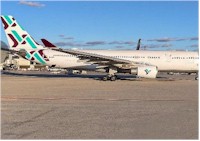 Name this airline – answer below. Name this airline – answer below. |


